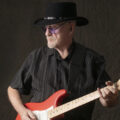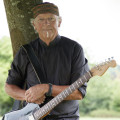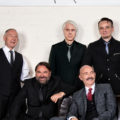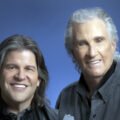Jeff Skunk Baxter eying Allstar Jam armed with “Speed Of Heat,” Steely Dan, Doobie Brothers
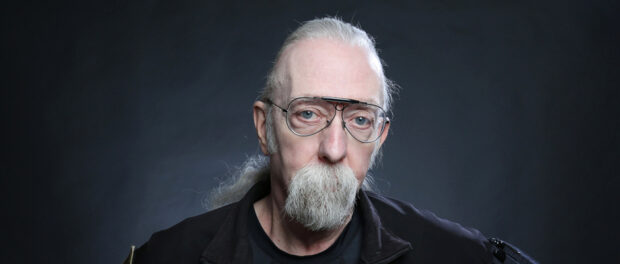 Photos provided by Jimmy Steinfeldt
Photos provided by Jimmy Steinfeldt
Spending more than six decades as an elite session guitarist means Jeff Skunk Baxter played with practically everyone, on top of being an original member of jazzy rockers Steely Dan and laying down the riffs on such classics as “Do It Again,” “Reelin’ In the Years” and “Rikki Don’t Lose That Number.”
Soon after, he not only officially joined The Doobie Brothers after being a frequent sideman straight out of “China Grove,” but brought Michael McDonald along just as they were soulfully “Takin’ It To The Streets” and stuck around long enough to find out “What A Fool Believes.”
Yet believe it or not, the 75-year-old star never made a solo album until “Speed Of Heat,” which as the Rock and Roll Hall of Famer tells Chicago Concert Reviews, will be featured next to a few favorites from each act during the Allstar Jam Summer Kickoff, co-starring Derek St. Holmes (Ted Nugent, Aerosmith’s Brad Whitford) and John Elefante (formerly of Kansas), on Saturday, May 25 at Bulldog Park just over the border in Crown Point, Indiana.
What do you have planned for the Allstar Jam Summer Kickoff?
 Jeff Skunk Baxter: I’m gonna be playing with two folks that I love playing with. One is John Elefante, who’s got one of the best voices I’ve ever heard in my life, and Derek St. Holmes. It should be a lot of fun. We’re just gonna do songs that we’re connected to in some way. I’ll be a doing a couple of Doobies stuff and some Steely Dan. It’s just going to be a fun evening of everybody playing what everybody else likes to play. And Sixwire, the band, is just amazing.
Jeff Skunk Baxter: I’m gonna be playing with two folks that I love playing with. One is John Elefante, who’s got one of the best voices I’ve ever heard in my life, and Derek St. Holmes. It should be a lot of fun. We’re just gonna do songs that we’re connected to in some way. I’ll be a doing a couple of Doobies stuff and some Steely Dan. It’s just going to be a fun evening of everybody playing what everybody else likes to play. And Sixwire, the band, is just amazing.
Do you have your own individual sets, rotate throughout the show or collaborate?
Baxter: Usually we’ll just do different sets, each of us, and then we do collaborate as well cause there’s songs that John likes to sing that I say, “Yeah, please come right up.” It used to be more disciplined, but it ends up with everybody playing with everybody.
So how did you guys all get connected?
Baxter: Sixwire, which is the band that is the core band out of Nashville. Some years ago, I started doing charity events with them for St. Jude’s Hospital with Kevin Cronin [R.E.O. Speedwagon], Alice Cooper, Felix Cavaliere [The Rascals] and Toby Keith. There’s a bunch of different players that would come in and play two or three songs. It became an opportunity, almost like a music party, where you got to meet folks that you never had a chance to play with, [plus] got to meet old friends and play with them again. That’s kind of how this all has evolved.
Are there shows you played in the past throughout this area that stand out?
Baxter: Let’s see, my dad was born in Indiana, so I’ve had a connection to that for many years. And as far as shows are concerned, it’s hard to say because I can’t even count how many shows I’ve done, but there’s nothing memorable that sticks out. The good news is there’s nothing memorable that sticks out! Nothing happened that was bad (laughs).
Does anything come to mind about Midwest audiences you might not encounter elsewhere?
Baxter: Yeah, I’d say that in a lot of ways audiences in the Midwest are more open. They’re less, and I don’t mean judgmental in a sense of sophistication because everybody’s sophisticated as everybody else, but they seem to be more interested in having a good time, as opposed to you attending an event, if you know what I mean. A lot of people attend events because it’s the hip thing to do, and for me, at least from what I’ve noticed, is most people in the Midwest come because they want to have a good time and listen to music. They don’t want to tell their friends, “well, I’m going to this,” you know?
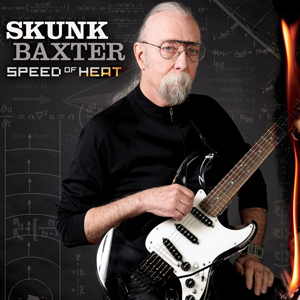 “Speed Of Heat” is actually your first ever solo album. What prompted the desire to finally go in this direction now?
“Speed Of Heat” is actually your first ever solo album. What prompted the desire to finally go in this direction now?
Baxter: I finally had a little bit of time with my songwriting and producing partner, C. J. Vanston. We would take some time when we both had time, and we’d go in, and start recording. We got to the point where, over a period of time, it’s like your jar is full of pennies and eventually you gotta roll ‘em up, right? It got to that point musically.
What’s on tap in terms of styles and sounds?
Baxter: I’ve been a studio musician for what is it now, 60 years. I certainly am comfortable with a number of different styles, so I just wanted to play the guitar, frankly. I wasn’t trying to impress anyone. I wasn’t trying to create commercial music that I thought would sell. I just wanted to enjoy playing the guitar for myself. I’m not doing a Dolly Parton session. I’m not doing a Rod Stewart session. I’m doing this for myself, and I get to choose the material, and the folks that I want to play on it, and just do something that’s for me (laughs). Not to be selfish, but to do something that I can focus on, and enjoy, and utilize the guitar playing skills that I have in a number of different areas.
What are a few of the sessions that really stood out for whatever reason?
Baxter: There’s been thousands of them so I’m trying to think. Certainly working with Dolly Parton when we did “9 To 5” and a number of other tunes on a couple of her albums. She’s an incredible woman and a very talented musician, way deep in terms of her understanding and knowledge of music. Working with her, I mean she was baking cookies and bringing ‘em into the band. As far as we were concerned, we’d do anything you want! You tell us, you name it and we’re there! So working with her was a joy, not to mention the songs.
I certainly enjoyed doing Donna Summer’s [“Bad Girls”], helping her get to the point where she could cross over from the disco genre into the more rock genre and it was fun being a part of that. Donna was a wonderful lady, a sweetheart, and again, dedicated musician, not just sit up at the microphone and pretend she’s a singer. She got deep into everything that we did. There are just so many sessions. The Joni Mitchell stuff, again, what a sweetheart. Talk about a deep musician…I never really had any sessions that I didn’t like. There may be a couple, but for the most part, I enjoyed the work and I enjoyed the challenge.
As far as being in a band, how would you describe your Steely Dan days?
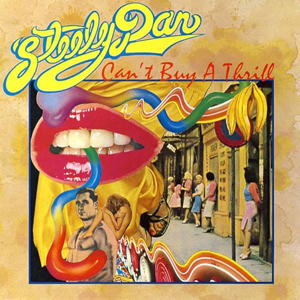 Baxter: It was great being in a band. We weren’t even sure what we were doing. We were just kids. We knew that the material was good and I loved the people that I was playing with. The journey was probably more interesting and enjoyable than getting to the end of the trip.
Baxter: It was great being in a band. We weren’t even sure what we were doing. We were just kids. We knew that the material was good and I loved the people that I was playing with. The journey was probably more interesting and enjoyable than getting to the end of the trip.
What are you most proud of from your three projects together?
Baxter: I think we had good commercial success, which is surely important to keep a band together and give it a future. I think the most successful single we ever had was “Rikki Don’t Lose That Number” and that was a fun song to do. I look at it from a different perspective. There are songs that I like, like “Razor Boy,” and the fact that everybody in the band was willing to take on a somewhat difficult endeavor by taking a Duke Ellington tune and taking a certain instrument, and transcribing it, and playing it on another instrument. That’s a challenge to me. That’s the kind of stuff I like, and so to be in a band where that was something that was not only acceptable, but something that you strive for, how do you get any better?
You guys weren’t just rock and roll, but also jazz and soul. How were you able to bridge all those elements?
Baxter: Being a studio musician and having played in every different kind of band there is, from R&B, to jazz quintets, to rock and roll, to country, to just about every style that I can think of, I guess for me it was, the word “easy” is wrong, but comfortable for me to interpret and be involved in any particular style that was called for. And to look at years of being a session musician [and determine] what might be the best synthesis of styles for a particular song.
It was a very fertile but short-lived period. Is there anything you would change?
Baxter: I think it was a natural progression. Then I went off to play with The Doobie Brothers and was already out on the road with Linda Ronstadt, and playing with other players. (Laughs) Mike McDonald used to joke I was in more bands at the same time then he’d ever been in his life (laughs), so I guess it was just that period of expanding my musical horizons with as many good players as I could.
Have you stayed in touch with Donald Fagan and do you ever foresee yourselves working together again?
Baxter: I haven’t talked to Donald in awhile, but I leave the door open. You just never know. I get calls from folks that I say, “wow, okay, let’s do something,” so I have no particular biases. I don’t have any bad memories or any reason to not want to get exploring whatever avenues open up.
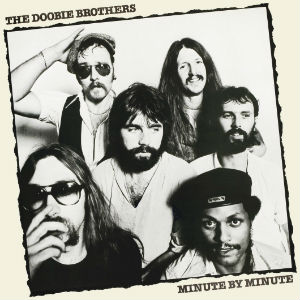 The band that got you in the Rock and Roll Hall of Fame was actually The Doobie Brothers. What was going on with the group when you initially joined?
The band that got you in the Rock and Roll Hall of Fame was actually The Doobie Brothers. What was going on with the group when you initially joined?
Baxter: Very successful. Great musicians, great players, great songs, touring. It doesn’t get any better.
In what ways did you play a part in shifting its sound from more straight up rock to a lot more soul?
Baxter: When I brought [former Steely Dan collaborator] Mike McDonald into the band, that certainly gave it a different flavor, somewhat of a different direction and I think it was the right decision to make. If you look at the results of having Michael in the band, and the success of the band towards the end of the ‘70s, again, it became one more adventure.
How did that direction open up new doors for the group?
Baxter: I know that I had talked to the producer, Ted Templeman, and suggested that the band start to work as a rhythm section for other artists, for Leo Sayer…and Carly Simon, [amongst others], just to inject a little bit of that Steely Dan discipline into the band and be able to be comfortable working with a keyboard player. [Little Feat’s] Billy Payne played piano and keyboards on a number of Doobies musical pieces, but wasn’t actually a member of the band. When a keyboard player is in the band, it changes the musical framework, so I convinced everyone that they should start working as a rhythm section and they were phenomenal. The depth of musicianship in that band was phenomenal.
Would you ever like to be a Doobie Brother again?
Baxter: Again, I’m open to anything. Life’s a series of adventures, and whenever a particular door opens, I’ll certainly walk in and see what the room looks like. And as far as this Allstar thing that’s coming up, it’s one more iteration of what happens when you get to play with and are around excellent musicians. I mean, I would’ve never thought I would be doing shows with John Elefante or Derek St. Holmes and it’s wonderful. I’m just really thrilled that whatever pathway I’ve taken has taken me to a place where I can play with some amazing players.
What was it like going from a band like Steely Dan, who didn’t really like to tour that much, to The Doobies, who were almost always on the road?
Baxter: For some reason, I don’t know if it was on purpose or by accident, people got the impression somehow that Steely Dan didn’t tour. We toured a lot. The first two years of that band we toured a lot, so I don’t know. I don’t know what it was like to be in a band that didn’t tour (laughs).
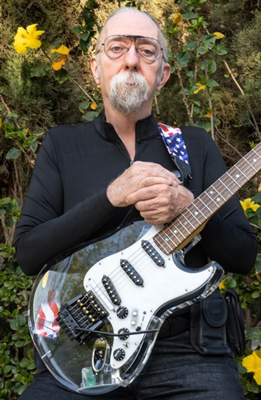 I stand corrected and perhaps it was after you left when they took a long hiatus.
I stand corrected and perhaps it was after you left when they took a long hiatus.
Baxter: Yeah, that’s very true. They had enough success, in terms of the record sales, that they could just concentrate on recording.
Then what was it like being on the road basically throughout all of the 1970s?
Baxter: It was energetic. It was fulfilling. It was a lot fun and it was an opportunity to play a lot of great music with a number of great musicians.
How do you feel about being on the road versus the studio? Is there an ideal schedule?
Baxter: There isn’t one. To me, they’re both different iterations of the same thing — playing music. Playing live is a delight because you get to play for people who enjoy what you do and you get the feedback. Being the studio, I wouldn’t have kept on doing it if I didn’t like it, so I don’t really have a preference. I’m just lucky that I have the opportunity to be involved in both iterations.
As you look at your crowds these days, what do you see when you’re playing?
Baxter: Everything from little kids with their parents having their headphones on and their ear plugs on to make sure they don’t damage their hearing, to people who are septuagenarians. There’s so many folks who have been exposed to so many different kinds of music and I don’t think it’s a specific demographic. Certain artists may have certain fans and certain demographics. I don’t really see one group of folks at all.
What is it about this music that’s allowed it to last so long?
Baxter: Because it’s good (laughs). Because it’s appealing. It’s been created in such a way that not only are the musicians who performed it satisfied with it, but it has appeal and reached out to a plethora of people. Like any kind of music, if people like it and it means something to them, then it will basically become immortal.
Do you have any thoughts on the current state of the music industry?
Baxter: It’s not like it used to be, but like anything else, everything evolves. It creates its own energy and we’ll see where it goes. There’s no telling. We’re moving into a world of artificial intelligence and a whole other way of being creative. I don’t know. It should be kind of exciting.
What do you ultimately hope your legacy will be?
Baxter: That when people came to hear me play, or they bought any record that I was involved in, or listened to any music that I was involved in, that it meant something to them, that they enjoyed it, maybe touched them in a certain way.
Jeff Skunk Baxter performs as part of the Allstar Jam Summer Kickoff at Bulldog Park in Crown Point, Indiana on Saturday, May 25. For additional details, visit JeffSkunkBaxter.com and GetLoudEntertainment.com.

